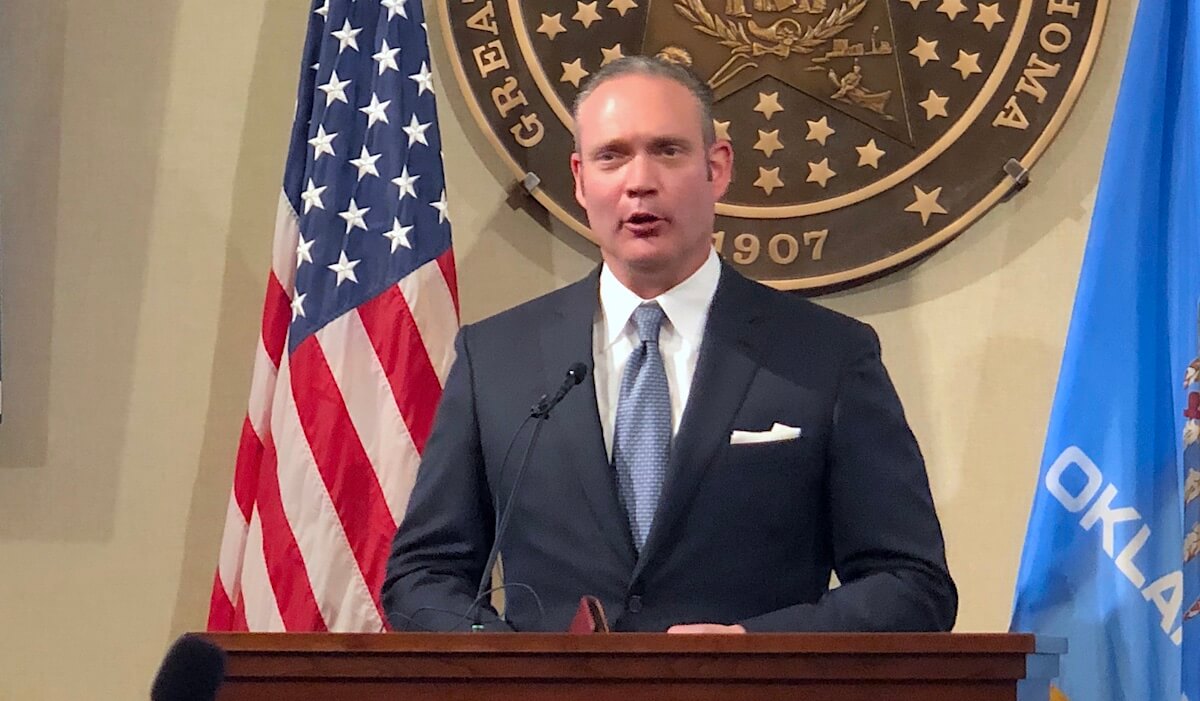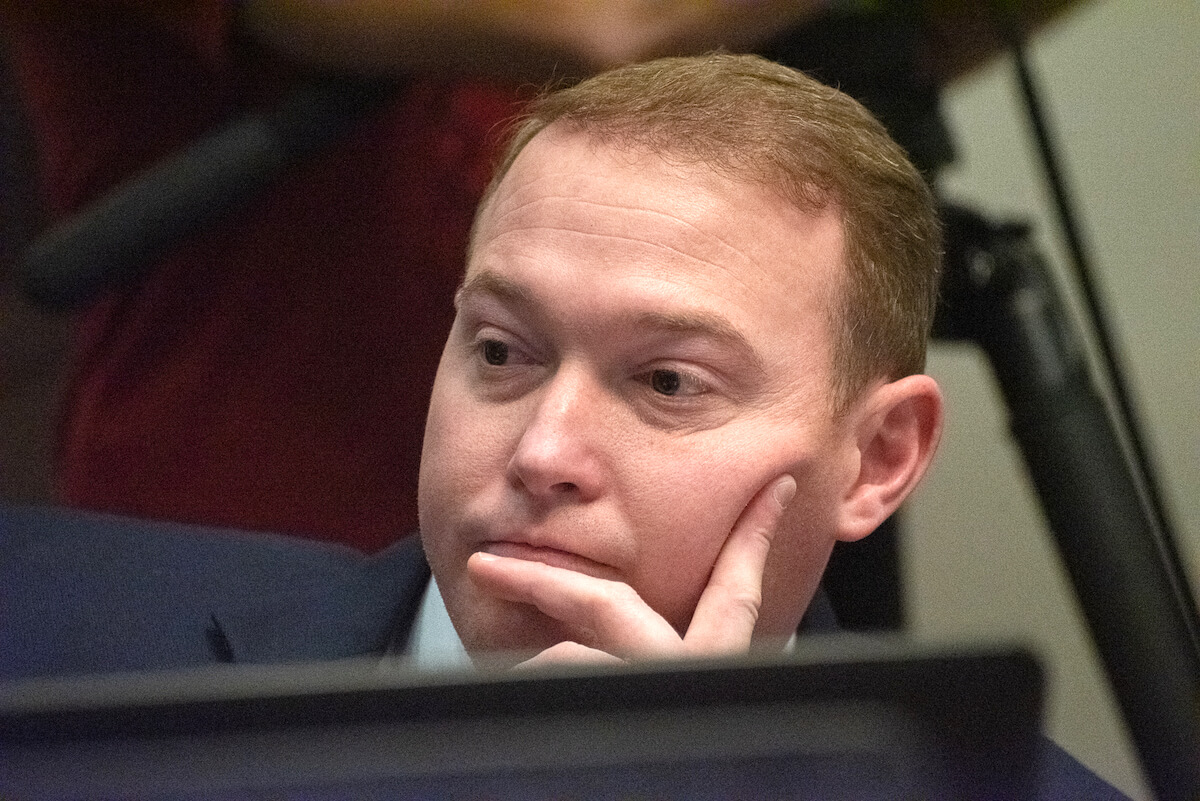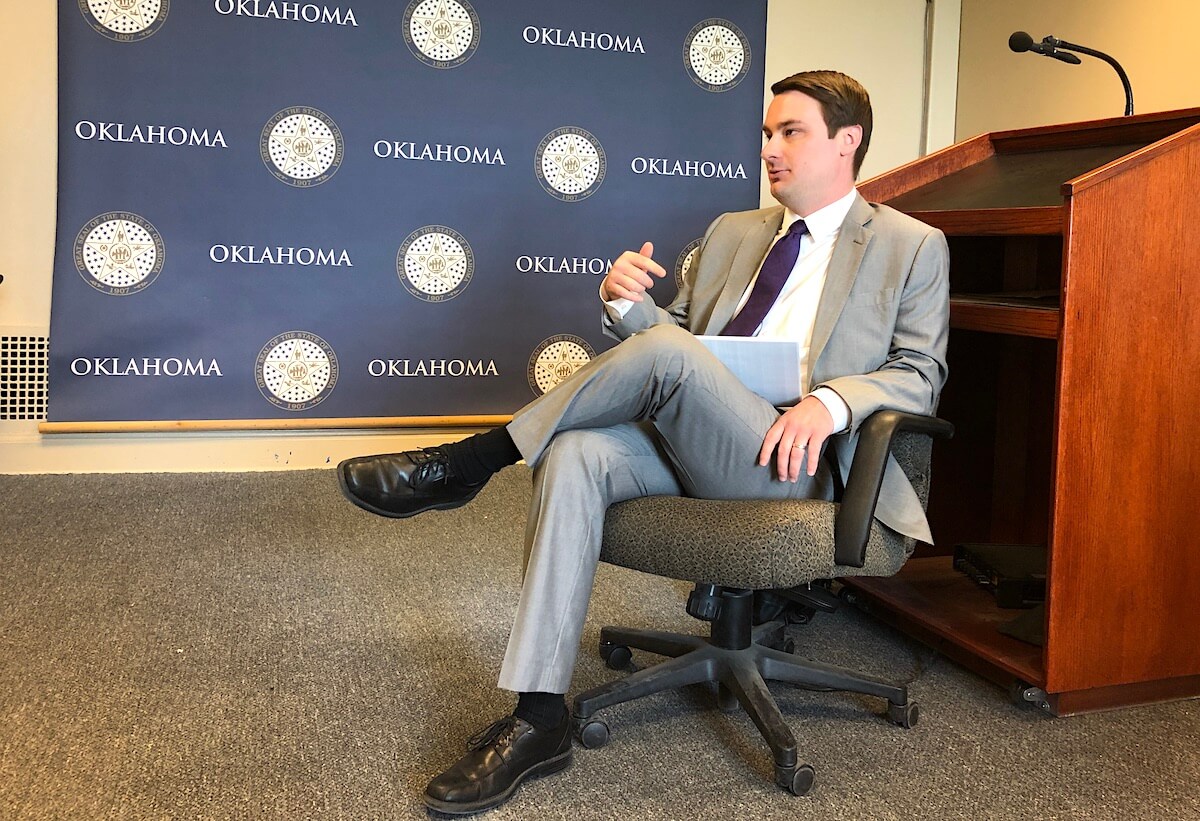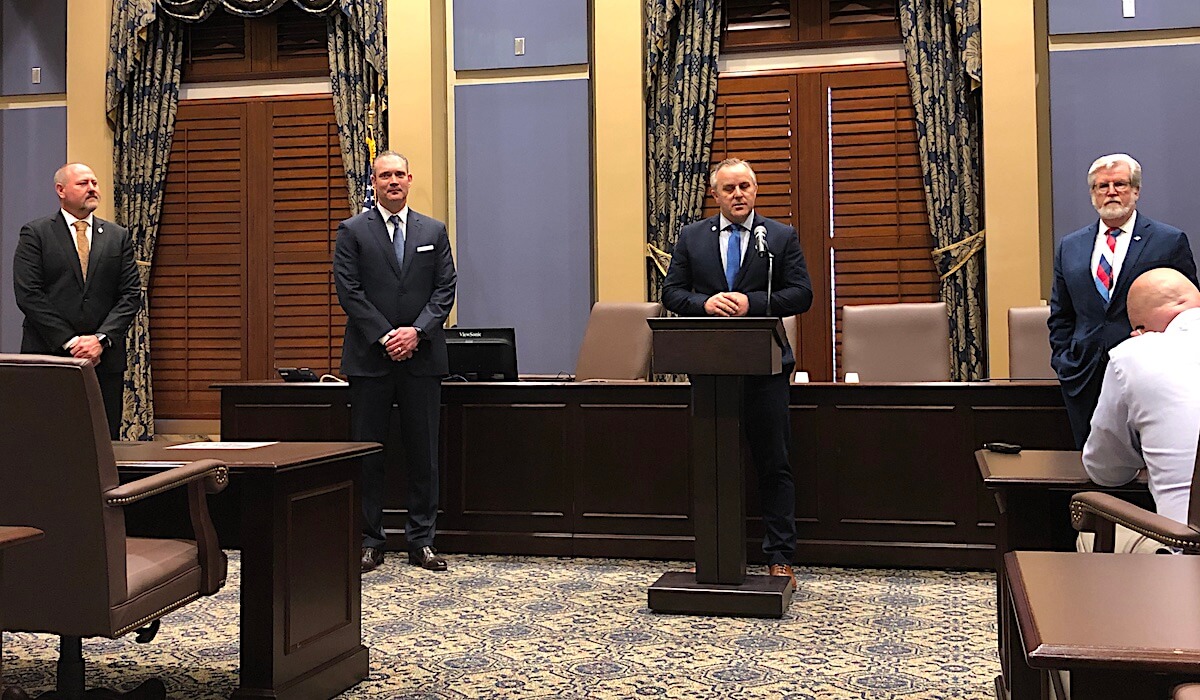
The Oklahoma Legislature has reached the functional halfway point on policy bills for the 2021 session, which means now is as good a time as any to get caught up on key proposals.
This brief list features more than 35 bills worth watching and includes measures related to state finances, health care policy and education. Other topics are included as well, and a bill’s inclusion should not be considered an endorsement. This list is not intended to be comprehensive.
House bills now head to the Senate for potential committee consideration and then potential floor approval. Similarly, Senate bills are now in the possession of the House, which will decide whether to hear them in committees and then on the floor.
One last note: Gov. Kevin Stitt has already signed HB 1246 into law after it passed both chambers unanimously with an immediate effective date. All House members were co-authors of the measure, which allows pharmaceuticals to be dispensed to someone whose state-issued identification card has been expired less than one year if a Social Security number can be provided.
Tax cuts, tax credits and a new levy for electric cars

The ball is now in the Senate’s court regarding two major tax-cut proposals House Speaker Charles McCall (R-Atoka) passed through the House fairly easily.
McCall’s HB 2041 to decrease personal income tax liability passed the House 91-5. The bill would create a base tax credit of $18 for individual filers and $30.50 for joint filers, with taxable income exceeding $7,200 for individuals or $12,200 for joint filers. In addition, filers would receive an additional credit equal to 0.25 percent of any taxable income above those amounts. The bill would also reinstitute the refundable nature of the earned income tax credit, a key policy priority for Democrats.
McCall’s HB 2083 to eliminate the corporate income tax over a five-year period was opposed by Democrats, passing 74-20 on the backs of the large House Republican Caucus. While the corporate income tax’s annual revenue is volatile, the proposal could cost the state about $64 million each year for the next five years. McCall believes eliminating the tax will make the state more competitive with Texas for recruiting businesses to relocate and expand.
While those two measures will decrease state revenues, HB 2234 by Rep. Kyle Hilbert (R-Depew) would establish an electric vehicle registration fee and, starting in 2024, impose a tax on for-profit electric vehicle charging stations. The new fee and tax could eventually raise substantial money as the electric vehicle industry expands, but the licensing fee will likely bring in less than $1 million in its first year. The bill advanced out of the House after clearing the three-fourth’s constitutional requirement (90-7) for revenue measures.
Hilbert is also pushing HB 2172, which would attempt to limit the state’s growing corporate property tax reimbursement obligations by adjusting qualification standards and raising from $250,000 to $500,000 the minimum investment threshold. The bill advanced from the House floor 81-13.
Health care, drugs and money

Lawmakers’ top health care decisions this session involve how to fund Medicaid expansion and whether to find a way to halt Stitt’s third-party managed Medicaid effort. Beyond that, however, several health care measures of note have made it out of their chambers of origin successfully.
HB 2677 by Rep. T.J. Marti (R-Broken Arrow) and Sen. Greg McCortney (R-Ada) would make numerous changes to pharmacy laws in Oklahoma, including new rules for pharmacy audits and pharmacy benefit managers. The bill passed the House 94-1 despite opposition from CVS Health and a coalition of pharmacy benefit managers and other organizations.
SB 511 by Sen. John Michael Montgomery (R-Lawton) and Rep. Carol Bush (R-Tulsa) would authorize groups to operate harm-reduction programs — also called needle exchanges — with the intention of reducing disease transmission and connecting intravenous drug users with drug treatment services and recovery support. After initially falling one vote shy of Senate passage, SB 511 ultimately advanced 28-18. A similar bill passed the House floor last year 73-19.
HB 2877 by Rep. Kevin Wallace (R-Wellston) and Sen. Zack Taylor (R-Seminole) would allow law enforcement officers to use telemedicine in certain circumstances when they encounter someone in need of a mental health evaluation.
Two bills have made it halfway home that would grant the University Hospitals Trust or any nonprofit entities contracting with them a sales tax exemption. SB 79 and HB 2874 are both alive and headed to their opposite chambers, however, HB 2874 had its title removed, meaning it would need to return to the House for a subsequent vote. The bills are similar to a measure vetoed last year by Gov. Kevin Stitt owing to concerns about an estimated $11 million financial impact to Oklahoma City. This year, the University of Oklahoma Health Sciences Center has proposed additional services for OKC’s municipal government in an effort to increase support for the bills.
HB 2504 by Rep. Chris Kannady (R-OKC) and Sen. Paul Rosino (R-OKC) would give the state more authority over leadership at the Oklahoma City-County Health Department and the Tulsa Health Department. It narrowly passed the House floor 54-41.
SB 918 by Senate Pro Tempore Greg Treat (R-OKC) and House Majority Floor Leader Jon Echols (R-OKC) would implement a ban on abortion in Oklahoma if the findings of the U.S. Supreme Court case Roe v. Wade are ever overturned.
Meanwhile, Rep. Scott Fetgatter (R-Okmulgee) and Sen. James Leewright (R-Bristow) are pushing two measures related to marijuana. HB 2022 and HB 2023 would make changes to licensing, application and other medical marijuana program rules. Fetgatter and Sen. Cody Rogers (R-Tulsa) are running HB 2004, which would adjust rules and operating procedures of the Oklahoma Medical Marijuana Authority.
School transfer bills transfer to opposite chambers

HB 2074 by House Speaker Charles McCall and Sen. Adam Pugh (R-Edmond) would create the Open Transfer Act of 2021 and would allow students to transfer to a different district anytime during the year as long as the receiving district has capacity. Each school district would be required to monitor its “capacity” and report that figure to the State Department of Education. A student’s transfer would be granted for one year, and the student may continue to attend the school district each school year after with approval from the school district receiving the student.
SB 783 authored by Pugh and Rep. Brad Boles (R-Marlow) also proposes a statewide transfer policy. It modifies the Education Open Transfer Act to allow students to transfer to any other school district throughout the year as long as the district they are transferring to has enrollment “capacity.” Beginning on Jan. 1, 2022, the measure would require school districts to determine the number of students they have the capacity to accept at every grade level for each school site by the first day of January, April, July and October. Districts must post this information on their websites and report it to the State Department of Education. School districts must also report their numbers of transfer approvals and denials, along with the reasonings for the approvals or denials, to the State Department of Education.
HB 2078 by Hilbert, Rep. Toni Hasenbeck (R-Elgin) and Sen. Zack Taylor (R-Seminole) would alter how school districts receive state-allocated aid. Rather than utilizing the current three-year enrollment high to determine per-pupil state aid for schools, HB 2078 would require funding for districts to be based on either the current year’s initial enrollment numbers or the previous year’s enrollment — whichever is higher — beginning with the 2022-2023 school year. The December calculation for funding, known as the midyear adjustment, would be based on enrollment totals for the first nine weeks of the current school year or the previous school year, whichever is higher. The bill passed out of the full House 68-30
HB 1568 by Rep. Jeff Boatman (R-Tulsa) and Sen. John Haste (R-Broken Arrow) would create Maria’s Law. Beginning with the 2022-2023 school year, it would require all Oklahoma school districts to include mental health education in any health education curriculum. The State Board of Education would collaborate with Department of Mental Health and Substance Abuse Services to adopt standards and develop age-appropriate mental health curriculum for grades kindergarten through 12th.
Similarly, SB 21 by Sen. Kay Floyd (D-OKC) and Rep. Marcus McEntire (R-Duncan) would require school boards to adopt a suicide awareness and training policy. School district faculty and staff would be required to undergo this training twice a year beginning with the 2021-2022 school year. The measure would also require suicide awareness and prevention training for students in grades 7th through 12th beginning with the 2022-2023 school year.
SB 239 by Sen. Dewayne Pemberton (R-Muskogee) establishes new guidelines and a new statewide appeal process for charter school applicants initially denied by their proposed sponsor. It also establishes a new requirement before the State Board of Education sponsors a new charter school. The bill advanced off of the Senate floor by a 30-16 vote.
Other 2021 session bills to observe

Several other pieces of legislation are worth tracking for the second half of session as well.
HB 1602 by Rep. Collin Walke (R-OKC), Rep. Josh West (R-Grove) and Sen. John Michael Montgomery (R-Lawton) would create the Oklahoma Computer Data Privacy Act and would require companies to ask digital users to authorize the collection of their personal data if that information is to be sold to third-parties. The bill has faced strong opposition from major companies, but it has also received strong bipartisan support, passing the House by an 85-11 margin. Whether is will receive consideration in the Senate stands as a major question for this session.
Called the Sarah Stitt Act, HB 1679 would require the Department of Corrections to work with the Department of Public Safety to provide a REAL ID noncompliant identification card to any person being released from prison who does not already have a state-issued card. It would also require DOC to provide those released with documents showing their vocational training record, work record, a Social Security card if needed, a résumé for any trade learned in prison and evidence that they have completed a practice job interview.
Authored by the Legislature’s two appropriations chairman, HB 2860 would create the Oklahoma Remote Quality Jobs Incentive Act to provide affordable health insurance access to proxy organizations that recruit remote workers to the state.
Meanwhile, HB 2863 would give the Commissioners of the Land Office greater authority over the sale or acquisition of real estate by state agencies. HB 2870 and SB 146 both would allow the CLO to have its investments handled by more than one banking institution and extends from five to 10 years the amount of time allowed between rebidding banking contracts. SB 147 also modifies rules governing the CLO.
SB 895 by Rosino and Kannady would allow public entities to contract with private auditing firms through a competitive bidding process. The State Auditor & Inspector’s Office would be allowed to bid on the jobs. The proposal has received criticism from State Auditor Cindy Byrd, and the Tulsa World reported that the bill has potential connections to Epic Charter Schools founder Ben Harris, who has been critical of Byrd’s audit of his controversial virtual schools. The bill would require financial audits to follow federal accounting standards, and it would also allow an entity being audited to include a response in the audit document.
SB 962 Treat and McCall would align school board elections with primary and general elections in even-numbered years. Currently, the elections happen during the first few months of odd-numbered years.
Treat and McCall are also running SB 1032 as a modernization of the Oklahoma Open Meeting Act. The bill would require all public bodies to livestream their meetings unless a technical or logistical difficulty makes that impossible. It would also permanently authorize digital meetings for entities in counties under a state of emergency. While Treat has said that he supports requiring public bodies to post their meeting notices and agendas on their websites, that requirement is not currently included in the bill.
HB 1795 by Rep. Nicole Miller (R-OKC) and Sen. Kim David (R-Porter) would reduce the number of driver licenses that are suspended owing to court costs. The bill advanced from the House on a 94-3 vote.
HB 2173 and SB 959 are both authored by Hilbert and Sen. Lonnie Paxton (R-Tuttle). The measures would allow for the governor to appoint a temporary U.S. senator in the event of a vacancy.
SB 383 by Sen. Rob Standridge (R-Norman) and Rep. Kevin West (R-Moore) would authorize the attorney general to bring a civil cause of action against social media companies on behalf of adult Oklahoma citizens whose political or religious posts or content were deleted by a company. The bill establishes a list of reasons for deleting content under which companies would not be liable, including posts that incite violence, feature obscene material, bully minors or entice criminal conduct.
Finally, McCall is also pushing a series of measures related to broadband internet:
- HB 2040 would create a sales and use tax rebate for new broadband equipment used to deliver service in unserved or underserved areas. The rebate would be capped at $20 million for 2022, with $15 million allocated for rural areas and $5 million designated for urban areas. It passed 85-14 out of the House.
- HB 2090 would expand membership of the Rural Broadband Expansion Council to include a tribal representative and a wireless internet service provider. The bill also would establish 25 megabits-per-second download and three megabits-per-second upload as the minimum speeds offered to be considered broadband service. It passed the House 97-0.
- HB 2928 would require internet providers to submit data for mapping all broadband assets in the state. It passed the House 98-0.
To search for categories of legislation in Oklahoma, use the Oklahoma Legislature’s advanced search form.
(Correction: This article was updated at 9:35 a.m. Monday, March 15, to remove HB 1564, which did not advance from the House. NonDoc regrets the error.)





















